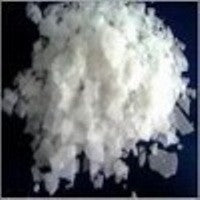POTASSIUM HYDROXIDE (KOH)
Technical grade - 90%
Potassium hydroxide (KOH) commonly known as caustic potash, is supplied as white flakes. It is deliquescent and rapidly dissolves in water and forms concentrated solutions of potassium hydroxide also known as potassium lye. The reaction with water is violent producing heat (exothermic reaction). Concentrated solutions in water are clear in colour. KOH is a strong alkaline substance that dissociates completely in water to potassium and hydroxyl ions.
Potassium Hydroxide is manufactured by the electrolysis of the salt potassium chloride. Solid potassium hydroxide is obtained from this solution by the evaporation of water.
Potassium hydroxide is used to manufacture of other potassium salts, soaps, biodiesel, rayon, paper, dyestuffs, and petroleum products. It is also used in processing cotton fabric, laundering and bleaching, metal cleaning and processing, oxide coating, electroplating, and electrolytic extracting. It is commonly present in commercial drain and oven cleaners. It is a common lab reagent for titrations, pH adjustments etc.
Potassium hydroxide is highly corrosive and should only be handled by professionals and suitably trained persons. It is not for sale to the general public.
PLEASE NOTE: This product is not for human or animal consumption.
Properties of Potassium Hydroxide
- Synonyms: caustic potash; potassium hydroxide flakes; Potassium hydrate; Potassium lye;
- Appearance: white solid flake
- CAS No: 1310-58-3
- EINECS No: 215-181-3
- Minimum quality: 90% minimum
- Molecular formula: KOH
- Molar mass: 56.11 g/mol
- Density: 0.84g/cm3
- Solubility in water: 120 g/100ml (20C)
- Melting point: 360 C
- Boiling point: 1320 C
- pH: 11.5
- Vapour pressure: 1.3 hPa at 20 C
Potassium hydroxide readily absorbs moisture and carbon dioxide from air and deliquesces. When dissolved in water or alcohol or when the solution is mixed with an acid the reaction is highly exothermic. When heated to decomposition it emits toxic fumes of K2O. When potassium hydroxide is wet, it attacks metals such as aluminium, tin, lead and zinc to produce flammable hydrogen gas. As well as water it is soluble in glycerine, ethanol, propanol, methanol ether and ammonium hydroxide. It reasts violently with strong acids like hydrochloric acid producing the potassium salt and water.
USES OF POTASSIUM HYDROXIDE
Potassium hydroxide to make other potassium compounds
Many potassium salts are prepared by neutralization reactions involving KOH. The potassium salts of carbonate, cyanide, permanganate, phosphate, chloride and various silicates are prepared by treating either the oxides or the acids with KOH. Potassium hydroxide used in the manufacture of biodiesel
Biodiesel manufacture
Although more expensive than using sodium hydroxide, KOH works well in the manufacture of biodiesel by saponification of the fats in vegetable oil.
Making Soap from Potassium hydroxide
Potassium hydroxide used in the manufacture of soft soaps. The saponification of fats with KOH is used to prepare the corresponding "potassium soaps" which are softer than the more common sodium hydroxide-derived soaps. Because of their softness and greater solubility, potassium soaps require less water to liquefy, and can thus contain more cleaning agent than liquefied sodium soaps.
Potassium hydroxide as an electrolyte
Aqueous potassium hydroxide is employed as the electrolyte in alkaline batteries based on nickel-cadmium and manganese dioxide-zinc. Potassium hydroxide is preferred over sodium hydroxide because its solutions are more conductive.
Other uses for potassium hydroxide
KOH attracts numerous specialized applications, which virtually all rely on its basic or degradative properties. KOH is widely used in the laboratory for the same purposes.
In chemical synthesis, the selection of KOH vs. NaOH is guided by the solubility for the resulting salt. Its corrosive properties make it useful as an ingredient in cleaning and disinfection of resistant surfaces and materials. The high alkalinity enables cleaners and degreasers to dissolve oils and greases by saponifying them. Likewise it is commonly used in commercial oven cleaners where the dissolving of carbon and baked on grease, sugar etc is required.
It is often the main active ingredient in chemical "cuticle removers."
KOH is also widely used as a way to remove hair from animal hides, leaving the hides in a solution of KOH and water for a few hours. It is used in resomation to dissolve human remains.
Aggressive bases will damage the cuticle of the hair shaft, and thus is useful for weakening the hair in preparation for shaving. Pre-shave products and shave creams such as Proraso contain Potassium Hydroxide in order to force the cuticle open and act as a hygroscopic agent to attract and force water into the shaft, causing further damage to the hair. In this state, the hair is more easily cut by razor blade.
Health & safety
R-phrase(s): R35 Causes severe burns. R22 Harmful if swallowed.
S-phrase(s): S1/2 Keep locked up and out of reach of children. S26 In case of contact with eyes, rinse immediately with plenty of water and seek medical advice. S36/37/39 Wear suitable protective clothing, gloves and eye/face protection. S45 In case of accident or if you feel unwell, seek medical advice immediately (show the label where possible).
Buy sodium hydroxide / caustic soda
Buy Potassium Hydroxide 30% solution